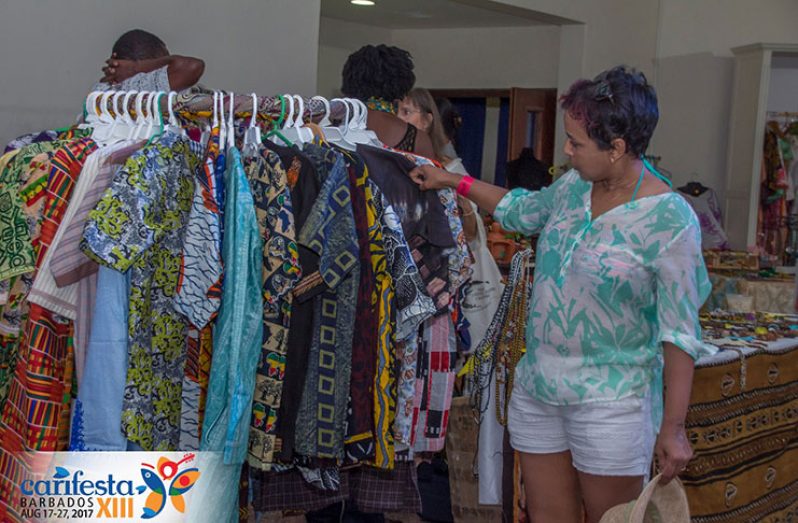AS the CARIFESTA festivities wind down and begin to draw to a close, host country Barbados is home to a proud and welcoming populace. For the second time in 36 years, Barbados is the proud host of the Caribbean Festival of Creative Arts (CARIFESTA).
In August 2015, Barbados took the baton from Haiti to host CARIFESTA 2017. The island has welcomed participants from 22 other Caribbean countries and like its sister CARICOM states, it is using the festival as a platform to showcase its rich culture.
The Department of Public Information (DPI) took a stroll around to soak up parts of the culture of the host country.
At one of the Barbados booths at the CARIFESTA Grand Market, Cherreb Clarke-Jackman

has a variety of Barbadian-made items showcasing the country’s rich culture.
These include fresh water pearl or stone necklaces, earrings and bracelets, bags, clothing, hats, cushions and soaps among other items that were all made by her and two craftswomen.
Clarke-Jackman is extremely proud to have been chosen to represent her country. She said thus far the response has been great and many persons had supported her booth.
Throughout the Caribbean, traditional dishes play an important part in both the family and community; they take a central role in holidays, festivals and family occasions. That sense of tradition in Caribbean cuisine is integral to regional identity with many islands naming traditional dishes as their official national dish.
The CARIFESTA Grand Market, afforded overseas and local visitors the opportunity to sample traditional Barbados cuisine available at several food stalls
Chefs Steve Collymore and Didier Skeete prepared a variety of scrumptious local dishes including garlic and rosemary pork, traditional cou cou, macaroni pies and rice and peas, as well as creole dishes, including amigo or breadfruit and accra and of course the Barbados national dish — flying fish and cou cou.
The response to these delicious meals is unbelievable, as the food stall is host to long lines daily.
Caribbean countries are also identified by their distinct, diverse cultures such as their artistic, musical, literary, culinary, political and social elements that represent Caribbean people. These cultures have historically been influenced by African, European, Amerindian, and Asian traditions.
Various Barbadians have taken the stage by storm, showcasing their rich culture. Among them was Leshan Sobers, who reflected her African culture with a Mother Sally portrayal. Sobers explained that Mother Sally symbolised fertility; an enticing woman who uses her bodily assets to lure men.
“This tradition dates back to when sailors used to visit Barbados to choose women with shapely figures,” Sobers explained.
Aziza Clarke, a former calypso queen of Barbados, gave an exuberant performance. Clarke who is proud to showcase her love for her country, said: “Calypso is love, powerful and it always brings a positive message.”
Folk-singing, also common in Barbados, saw several acts at the festival. One of the performers Joan Atherles admitted that the art was slowly dying, but she was happy to reintroduce it. “It’s calypso from way back, but we just put historic meaning to them and put them on stage,” Atherles said.
Several other cultural activities were also displayed by Barbados. The closing ceremony was slated for Saturday.



.jpg)








